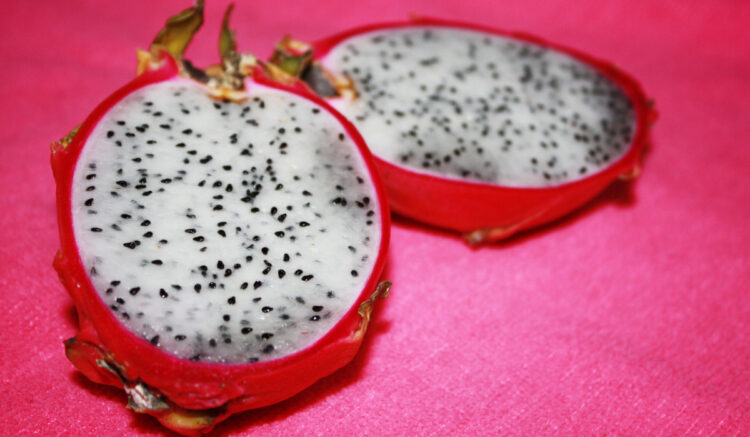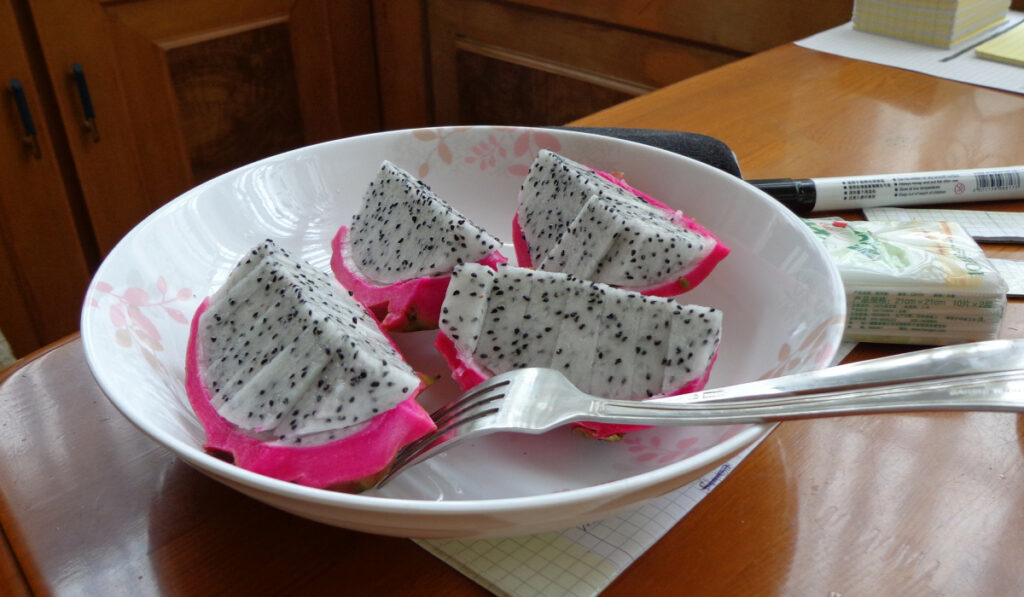Pitaya: properties and health benefits

Not everyone knows that eating pitaya or dragon fruit is good for health. The pitaya is a very particular exotic fruit and also known as dragon fruit. Let’s find out what pitaya is, its properties, nutritional values and more
What is pitaya
The pitaya or dragon fruit is a tropical fruit that derives from a plant belonging to the Hylocereus genus and to the Cactaceae family. The cultivation of the pitaya, to date, takes place mainly in some regions of Asia. The pitaya flower is about 25 cm long, is white in color and gives off a scent similar to that of vanilla. The fruit that produces this succulent plant vaguely recalls the prickly pear and internally the kiwi. It is characterized by having a very bright color, its external part is in fact fuchsia, scaly and with green parts while the interior is white and pulpy studded with numerous black seeds. This is the most common type of pitaya but there are actually other species of pitaya, one with red flesh and another with yellow skin.
The pitaya or dragon fruit: variety
Dragon fruits tend to be pink in color, although they can be distinguished in:
- Red Pitaya
- yellow pitaya
according to the color of the external part, while the internal pulp is white with numerous and small black seeds.
The pitaya or dragon fruit are very fragrant and have a soft consistency and a very sweet and delicate flavor. Benefits of pitaya In Italy, to date, pitaya is not yet very well known, but this exotic fruit has significant beneficial properties for health.
Pitaya, properties and health benefits
- It counteracts chronic diseases such as diabetes, cancer and cardiovascular disease.
- Antioxidant : the antioxidant content of this fruit is similar to that of acai berries, which is why dragon fruit is often considered a super food. It is rich in antioxidants and micronutrients, such as iron, magnesium, vitamin C and vitamin E.
- Digestion: thanks to the conspicuous presence of fiber, dragon fruits promote digestion and help in case of constipation. Promotes gut microbiota health.
- Reduces cholesterol : thanks to the monounsaturated fats present in this fruit, pitaya helps heart health by helping to reduce cholesterol levels.
- Benefits for Diabetes : Regular consumption of dragon fruit is linked to lower blood sugar levels, which is beneficial for type 2 diabetics and prediabetics.
- Weight loss : again thanks to the richness in fibers that promote the sense of satiety and help stabilize blood sugar levels, these fruits are allies of those on a diet.
- Prevents anemia : thanks to the richness of iron and vitamin C (which, as we know, promotes their assimilation), pitaya helps to counteract anemia.
- Stimulates cell regeneration : these fruits help cells reproduce better and accelerate the healing of wounds and injuries.
Pitaya, nutritional values and calories
A pitaya contains on average about 60 calories and the nutritional values of this fruit are very interested. It is in fact rich in vitamins (including vitamins C, B1, B2 and B3) and minerals such as calcium, iron, magnesium and phosphorus. It is also a good source of essential fatty acids as well as fiber and protein.
This is the nutrients present in 100 grams of fruit :
- Water 87 g
- Protein 1.1 g
- Fat 0.4 g
- Carbohydrates 11.0 g
- Fiber 3 g
- Vitamin B1 (thiamine) 0.04 mg
- Vitamin B2 (riboflavin) 0.05 mg
- Vitamin B3 (niacin) 0.16 mg
- Vitamin C (ascorbic acid) 20.5 mg
- Calcium (Ca) 8.5 mg
- Iron (Fe) 1.9 mg
- Phosphorus (P) 22.5 mg

























+ There are no comments
Add yours